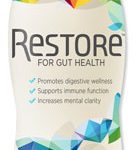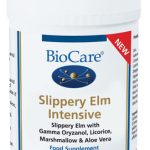Thanks to its name, it may sound silly or twee, but a leaky gut’s no laughing matter. That’s because it means the gut’s failing in its primary function – to provide a reliable transportation route through the body for potentially harmful elements in consumed food. If you have leaky gut then, owing to perforations in your intestinal wall, molecules and micro-organisms are able to get into your bloodstream. Not nice – and not at all twee. And, unfortunately, because it can play a role in causing many different ailments, it’s often something far from easy to diagnose; resulting in any number of potential symptoms. In which case then, let’s take a closer look at what leaky gut is all about – and how you can prevent and treat it.
How does leaky gut occur?
To understand how and why leaky gut happens, it’s necessary to understand the gut itself. The gut – or the intestines – is, of course, an organ of the digestive system; in fact, its largest and most important, boasting a surface area of around 2,700 sq. ft. (250 sq. m) – about the size of a tennis court. Included in the make-up of the gut is its intestinal mucosa (lining), which itself comprises the intestines’ microbial community. So, as digested molecules (micro-, macro and phytonutrients) pass through the gut on their way through the digestive system, they inevitably encounter the gut mucosa; unfortunately, though, should you suffer from leaky gut, the tight junctions between the cells of the mucosa won’t be tight enough, so potentially harmful foreign bodies can slip through the intestine’s lining and find their way into other parts of the body1. What foreign bodies? Nasty microscopic pathogens, toxins and antigens; all getting to chance to go where they like, provoking systemic inflammation1.
What causes leaky gut?
Evidently, these tight junctions between the gut’s cells are far from a total barrier; they relax and contract often and, thus, their function’s disrupted1. Factors that cause this include:
• Diet – of course, your diet inevitably has a big effect on your gut health (and on your health in general); an abundance of the following in your diet is bound to help cause leaky gut:
1. Additives – emulsifiers, glucose, microbial transglutaminase, solvents and even salt can make leaky gut syndrome worse2
2. Alcohol – as alcohol makes its journey through the gastrointestinal system, the metabolic by-product acetaldehyde’s created, which can increase intestinal permeability3
3. Dairy products – often associated with gastrointestinal disorders, not least for people who are lactose intolerant and those who have autism4
4. Gluten – for those who have gluten sensitivity, its consumption is very likely to proliferate intestinal permeability5
5. Pesticides – the herbicide glyphosate is great at disrupting gut bacteria, which aids intestinal permeability6
6. Sugar – often a cause of inflammation in the gut; so much so that research proves analysis of glucose in urine can indicate the severity of leaky gut7
• Candida – specific species of this yeast like nothing more than interfering with gut microbiota, resulting in an imbalance known as dysbiosis that can often lead to digestive issues including leaky gut8
• Chronic stress – yes, it’s true, psychological stress contributes to gut ill-health because it boosts levels of inflammatory cytokines (immune-related proteins) that drive up leaky gut; no surprise then that studies suggests stress compromises the intestinal barrier9
• Environmental toxins – as you’ll be aware, the outside world is full of poisonous toxins; mercury10, bisphenol A (BPA)11, fungicides, and insecticides12 all have the capacity to impair intestinal permeability
• Medications – it’s well known that over-the-counter drugs, especially non-steroidal anti-inflammatory drugs (NSAIDs) like aspirin and ibuprofen, can cause inflammation and drive up intestinal permeability13
• Zinc deficiency – an essential trace mineral for many different parts of the body, zinc is especially important for the immune system and preventing and treating irritable bowel-related conditions; as such, its deficiency can aid intestinal permeability, while its supplementation enhances tight junction activity14.
What can leaky gut cause?
Unfortunately, leaky gut’s symptoms are varied – in that, like it or not, they extend way beyond digestive disorders thanks to it enabling harmful foreign microbes to enter the bloodstream. Common symptoms then include the likes of allergies15, cardiovascular problems16 and many different metabolic issues17. Less obvious – but equally possible – illnesses that may be traced to leaky gut are both chronic fatigue syndrome and depression; research proves they can occur when the integrity of gut mucosa’s been compromised18.
Treating leaky gut
Experts agree that managing leaky gut’s best achieved by maintaining a healthy diet; particularly one that features food high in probiotics (yoghurt, kefir, microalgae and even dark chocolate are all recommended)19. Moreover, nutrients including glutamine and curcumin are great for the intestines because they help to manage the immune system’s overstimulated response to leaky gut (and the resultant escaping microbes) and, thus, the oxidative stress that further compromises the intestinal wall20.
And you may too like the idea of supplementing an improved diet to mitigate the disorder’s effects with, yes, natural leaky gut supplements. So, why not take a glance at the ‘Leaky Gut’ page of supplements on The Finchley Clinic’s website? Among which you’ll find these highly regarded products:
 Restore (for Gut Health) – a unique and ground-breaking supplement that heals the gut mucosa and supports membrane integrity to give your immune system a chance to rest.
Restore (for Gut Health) – a unique and ground-breaking supplement that heals the gut mucosa and supports membrane integrity to give your immune system a chance to rest.
Restore (for Gut Health) (travel size) – ideal for giving Restore a trial-run or for when you’re in transit.
S lippery Elm Intensive – soothes the digestive tract and provides mucilage to support the gut’s mucous membranes.
lippery Elm Intensive – soothes the digestive tract and provides mucilage to support the gut’s mucous membranes.
References:
1. Lee S. H. ‘Intestinal Permeability Regulation by Tight Junction: Implication on Inflammatory Bowel Diseases’. Intest Res. 2015 Jan; 13 (1): 11–18. Published online 2015 Jan 29. doi: 10.5217/ir.2015.13.1.11.
2. Lerner A. and Matthias T. ‘Changes in intestinal tight junction permeability associated with industrial food additives explain the rising incidence of autoimmune disease’. Autoimmun Rev. 2015 Jun; 14 (6): 479-89. doi: 10.1016/j.autrev.2015.01.009. Epub 2015 Feb 9.
3. Purohit V. et al. ‘Alcohol, Intestinal Bacterial Growth, Intestinal Permeability to Endotoxin, and Medical Consequences. Alcohol’. Alcohol. 2008 Aug; 42 (5): 349–361. Published online 2008 May 27. doi: 10.1016/j.alcohol.2008.03.131.
4. Whiteley P. et al. ‘Gluten- and casein-free dietary intervention for autism spectrum conditions’. Published online 2013 Jan 4. Pre-published online 2012 Nov 27. doi: 10.3389/fnhum.2012.00344.
5. de Punder K. and Pruimboom L. ‘The Dietary Intake of Wheat and other Cereal Grains and Their Role in Inflammation’. Nutrients. 2013 Mar; 5 (3): 771–787. Published online 2013 Mar 12. doi: 10.3390/nu5030771.
6. Samsel A. and Seneff S. ‘Glyphosate, pathways to modern diseases II: Celiac sprue and gluten intolerance’. Interdiscip Toxicol. 2013 Dec; 6 (4): 159–184. Published online 2013 Dec. doi: 10.2478/intox-2013-0026.
7. Rao A. S. et al. ‘Urine sugars for in vivo gut permeability: validation and comparisons in irritable bowel syndrome-diarrhea and controls’. Am J Physiol Gastrointest Liver Physiol. 2011 Nov; 301 (5): G919-28. doi: 10.1152/ajpgi.00168.2011. Epub 2011 Aug 11.
8. Schulze J. and Sonnenborn U. ‘Yeasts in the Gut: From Commensals to Infectious Agents’. Dtsch Arztebl Int. 2009 Dec; 106 (51-52): 837–842.
9. Bested A. et al. ‘Intestinal microbiota, probiotics and mental health: from Metchnikoff to modern advances: Part II – contemporary contextual research’. Gut Pathog. 2013; 5: 3. Published online 2013 Mar 14. doi: 10.1186/1757-4749-5-3.
10. US Food and Drug Administration. ‘DAMS Fact Sheets on Mercury Exposure’. https://www.fda.gov/ohrms/dockets/dailys/02/Sep02/091602/80027de0.pdf.
11. Braniste V. et al. ‘Impact of oral bisphenol A at reference doses on intestinal barrier function and sex differences after perinatal exposure in rats’. Proc Natl Acad Sci USA. 2010 Jan 5; 107 (1): 448–453.
12. Cohen M. ‘Environmental toxins and health – the health impact of pesticides’. Aust Fam Physician. 2007 Dec; 36 (12): 1002-4.
13. Sigthorsson G. et al. ‘Intestinal permeability and inflammation in patients on NSAIDs’. Gut. 1998 Oct; 43 (4): 506–511.
14. MedlinePlus. ‘Zinc in Diet’. https://medlineplus.gov/ency/article/002416.htm.
15. Perrier C. and Corthésy B. ‘Gut permeability and food allergies’. Clin Exp Allergy. 2011 Jan; 41 (1): 20-8. doi: 10.1111/j.1365-2222.2010.03639.x. Epub 2010 Nov 11.
16. Sandek A. et al. ‘The emerging role of the gut in chronic heart failure’. Curr Opin Clin Nutr Metab Care. 2008 Sep; 11 (5): 632-9. doi: 10.1097/MCO.0b013e32830a4c6e.
17. Bounous G. et al. ‘Biosynthesis of intestinal mucin in shock: relationship to tryptic hemorrhagic enteritis and permeability to curare’. Ann Surg. 1966 Jul; 164 (1): 13-22.
18. Schnabl B. ‘Linking intestinal homeostasis and liver disease’. Curr Opin Gastroenterol. Author manuscript; available in PMC 2014 Jul 1. Published in final edited form as: Curr Opin Gastroenterol. 2013 May; 29 (3): 264-270 doi: 10.1097/MOG.0b013e32835ff948.
19. Rao R. and Samak G. ‘Protection and Restitution of Gut Barrier by Probiotics: Nutritional and Clinical Implications’. Curr Nutr Food Sci. 2013 May 1; 9 (2): 99-107.
20. Rapin J. R. and Wiernsperger N. ‘Possible links between intestinal permeability and food processing: A potential therapeutic niche for glutamine’. Clinics (Sao Paulo). 2010 Jun; 65 (6): 635-43. doi: 10.1590/S1807-59322010000600012.

